Ethics in Commonwealth Bank of Australia: Impact on Business Decisions and Relevance in Small Businesses
VerifiedAdded on 2023/04/25
|13
|2981
|153
AI Summary
This is a summary of a report on the relevance of ethics in business decisions and the impact of ethics on such decisions, focusing on the Commonwealth Bank of Australia (CBA). The report evaluates the link between ethics and the business decisions taken by CBA and presents the various rules, regulations, and policies followed by the company for taking business decisions. The report also discusses cases of ethical decision-making by CBA and examines the relevance of ethics in small-scale businesses. The report includes sections on the positive impact of ethics in business decisions, treatment of employees, competition, financial activities, social impact, policies and practices of CBA, ethical decision-making by CBA, and the relevance of ethics in small businesses.
Contribute Materials
Your contribution can guide someone’s learning journey. Share your
documents today.
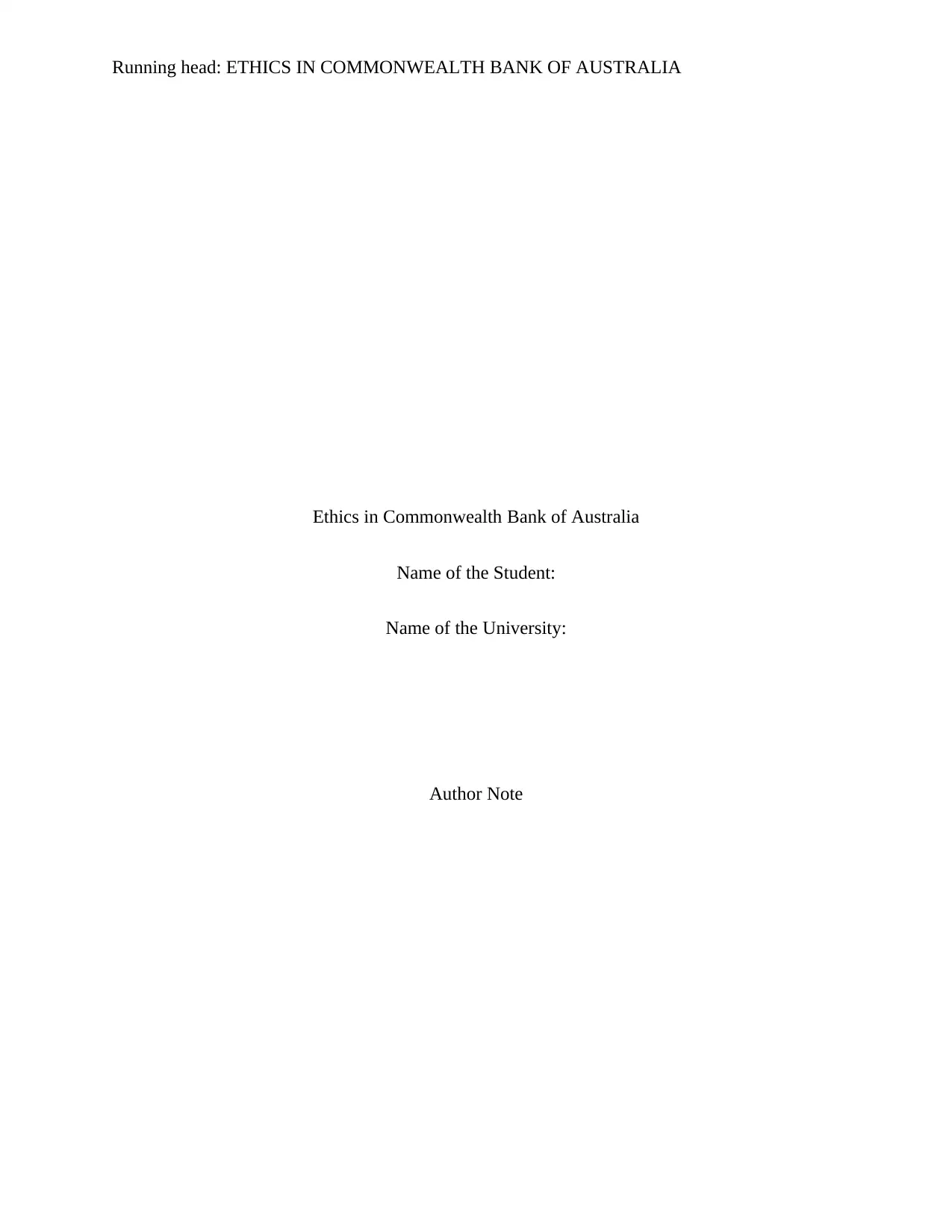
Running head: ETHICS IN COMMONWEALTH BANK OF AUSTRALIA
Ethics in Commonwealth Bank of Australia
Name of the Student:
Name of the University:
Author Note
Ethics in Commonwealth Bank of Australia
Name of the Student:
Name of the University:
Author Note
Secure Best Marks with AI Grader
Need help grading? Try our AI Grader for instant feedback on your assignments.
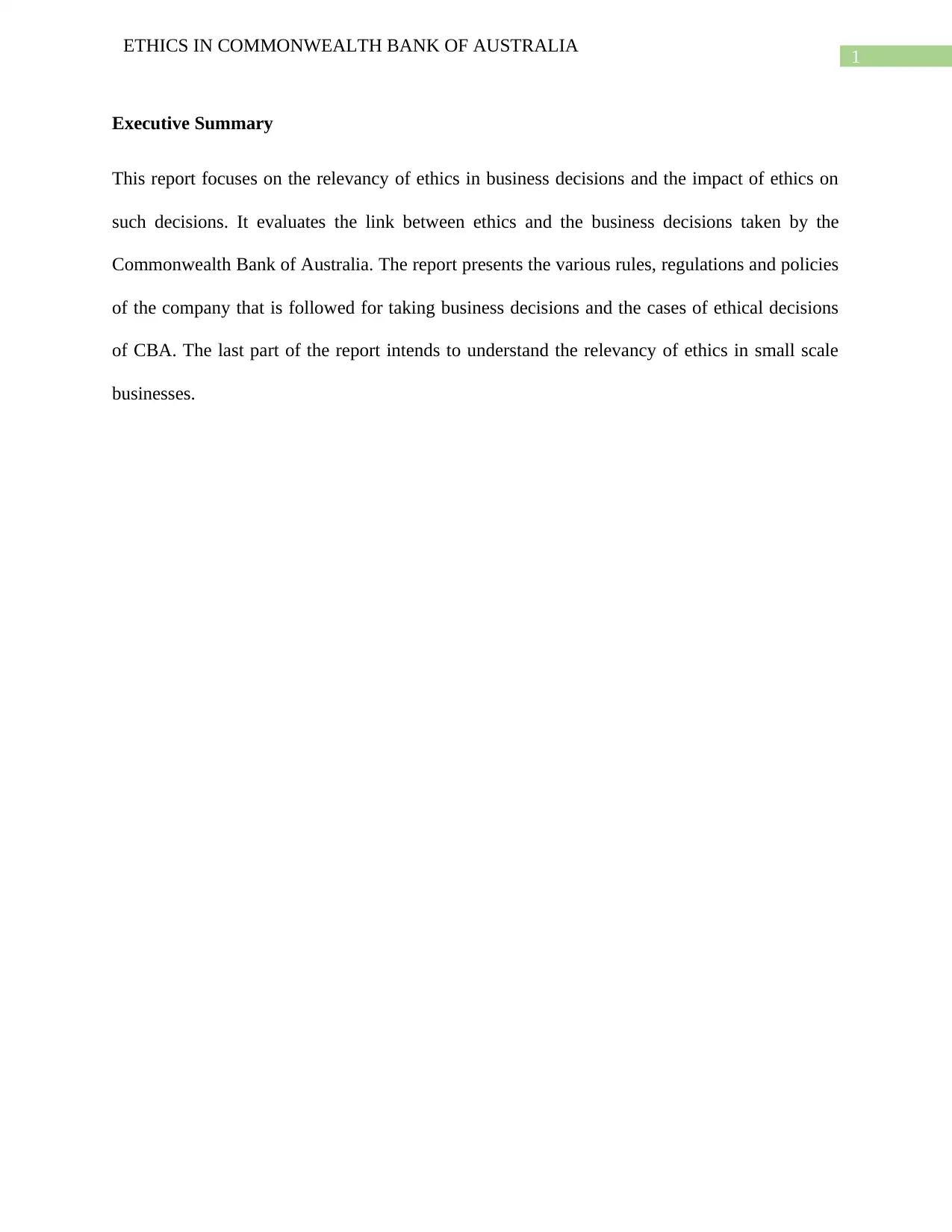
1
ETHICS IN COMMONWEALTH BANK OF AUSTRALIA
Executive Summary
This report focuses on the relevancy of ethics in business decisions and the impact of ethics on
such decisions. It evaluates the link between ethics and the business decisions taken by the
Commonwealth Bank of Australia. The report presents the various rules, regulations and policies
of the company that is followed for taking business decisions and the cases of ethical decisions
of CBA. The last part of the report intends to understand the relevancy of ethics in small scale
businesses.
ETHICS IN COMMONWEALTH BANK OF AUSTRALIA
Executive Summary
This report focuses on the relevancy of ethics in business decisions and the impact of ethics on
such decisions. It evaluates the link between ethics and the business decisions taken by the
Commonwealth Bank of Australia. The report presents the various rules, regulations and policies
of the company that is followed for taking business decisions and the cases of ethical decisions
of CBA. The last part of the report intends to understand the relevancy of ethics in small scale
businesses.
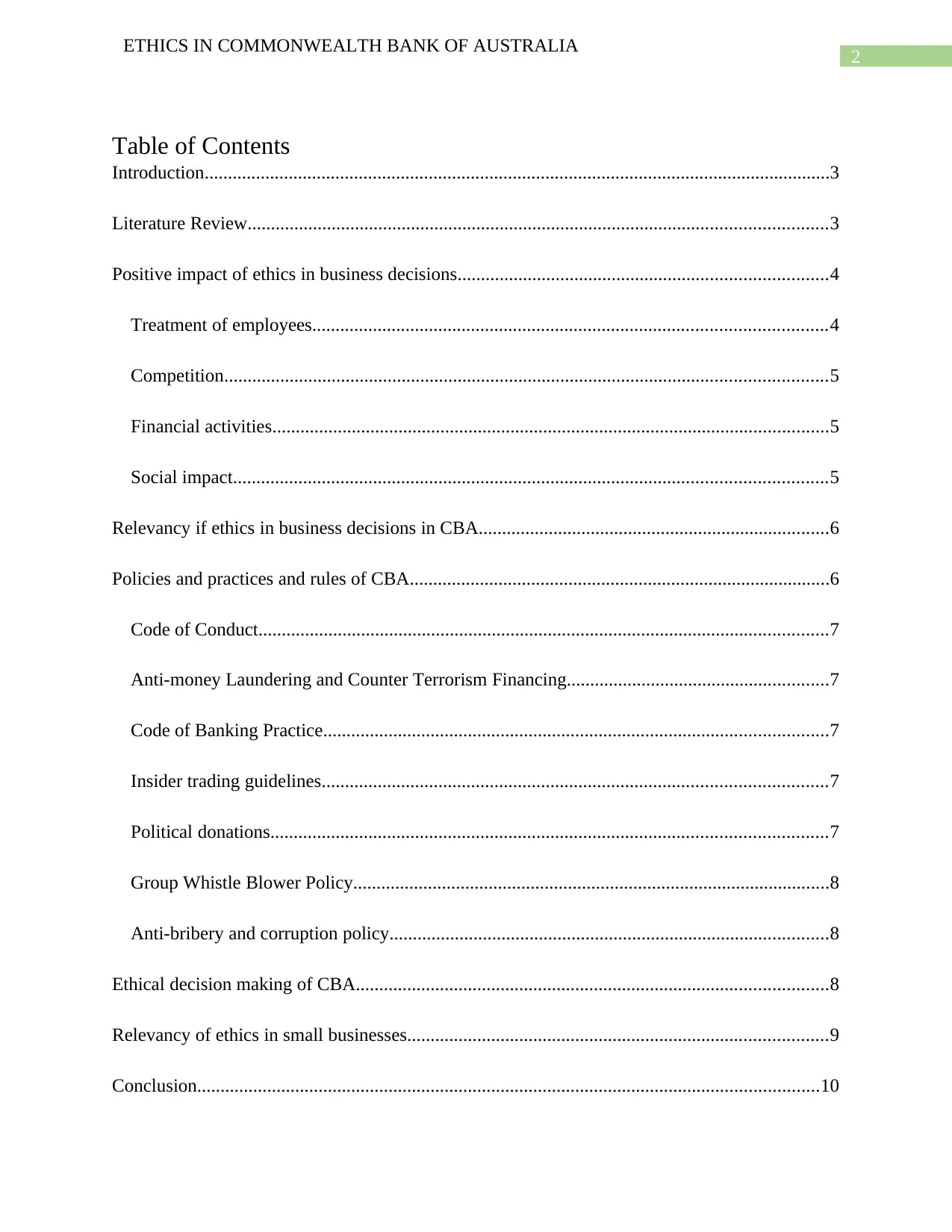
2
ETHICS IN COMMONWEALTH BANK OF AUSTRALIA
Table of Contents
Introduction......................................................................................................................................3
Literature Review............................................................................................................................3
Positive impact of ethics in business decisions...............................................................................4
Treatment of employees..............................................................................................................4
Competition.................................................................................................................................5
Financial activities.......................................................................................................................5
Social impact...............................................................................................................................5
Relevancy if ethics in business decisions in CBA...........................................................................6
Policies and practices and rules of CBA..........................................................................................6
Code of Conduct..........................................................................................................................7
Anti-money Laundering and Counter Terrorism Financing........................................................7
Code of Banking Practice............................................................................................................7
Insider trading guidelines............................................................................................................7
Political donations.......................................................................................................................7
Group Whistle Blower Policy......................................................................................................8
Anti-bribery and corruption policy..............................................................................................8
Ethical decision making of CBA.....................................................................................................8
Relevancy of ethics in small businesses..........................................................................................9
Conclusion.....................................................................................................................................10
ETHICS IN COMMONWEALTH BANK OF AUSTRALIA
Table of Contents
Introduction......................................................................................................................................3
Literature Review............................................................................................................................3
Positive impact of ethics in business decisions...............................................................................4
Treatment of employees..............................................................................................................4
Competition.................................................................................................................................5
Financial activities.......................................................................................................................5
Social impact...............................................................................................................................5
Relevancy if ethics in business decisions in CBA...........................................................................6
Policies and practices and rules of CBA..........................................................................................6
Code of Conduct..........................................................................................................................7
Anti-money Laundering and Counter Terrorism Financing........................................................7
Code of Banking Practice............................................................................................................7
Insider trading guidelines............................................................................................................7
Political donations.......................................................................................................................7
Group Whistle Blower Policy......................................................................................................8
Anti-bribery and corruption policy..............................................................................................8
Ethical decision making of CBA.....................................................................................................8
Relevancy of ethics in small businesses..........................................................................................9
Conclusion.....................................................................................................................................10
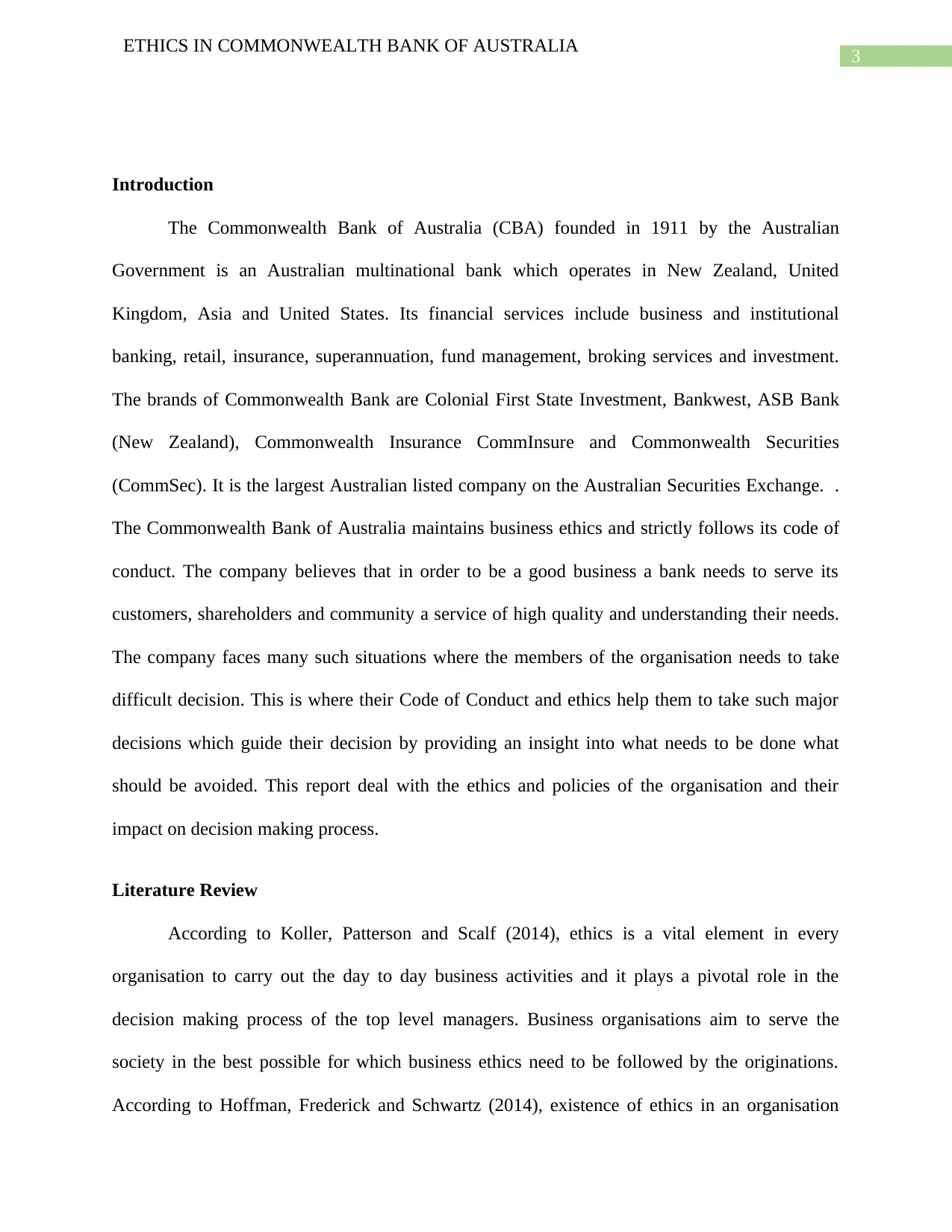
3
ETHICS IN COMMONWEALTH BANK OF AUSTRALIA
Introduction
The Commonwealth Bank of Australia (CBA) founded in 1911 by the Australian
Government is an Australian multinational bank which operates in New Zealand, United
Kingdom, Asia and United States. Its financial services include business and institutional
banking, retail, insurance, superannuation, fund management, broking services and investment.
The brands of Commonwealth Bank are Colonial First State Investment, Bankwest, ASB Bank
(New Zealand), Commonwealth Insurance CommInsure and Commonwealth Securities
(CommSec). It is the largest Australian listed company on the Australian Securities Exchange. .
The Commonwealth Bank of Australia maintains business ethics and strictly follows its code of
conduct. The company believes that in order to be a good business a bank needs to serve its
customers, shareholders and community a service of high quality and understanding their needs.
The company faces many such situations where the members of the organisation needs to take
difficult decision. This is where their Code of Conduct and ethics help them to take such major
decisions which guide their decision by providing an insight into what needs to be done what
should be avoided. This report deal with the ethics and policies of the organisation and their
impact on decision making process.
Literature Review
According to Koller, Patterson and Scalf (2014), ethics is a vital element in every
organisation to carry out the day to day business activities and it plays a pivotal role in the
decision making process of the top level managers. Business organisations aim to serve the
society in the best possible for which business ethics need to be followed by the originations.
According to Hoffman, Frederick and Schwartz (2014), existence of ethics in an organisation
ETHICS IN COMMONWEALTH BANK OF AUSTRALIA
Introduction
The Commonwealth Bank of Australia (CBA) founded in 1911 by the Australian
Government is an Australian multinational bank which operates in New Zealand, United
Kingdom, Asia and United States. Its financial services include business and institutional
banking, retail, insurance, superannuation, fund management, broking services and investment.
The brands of Commonwealth Bank are Colonial First State Investment, Bankwest, ASB Bank
(New Zealand), Commonwealth Insurance CommInsure and Commonwealth Securities
(CommSec). It is the largest Australian listed company on the Australian Securities Exchange. .
The Commonwealth Bank of Australia maintains business ethics and strictly follows its code of
conduct. The company believes that in order to be a good business a bank needs to serve its
customers, shareholders and community a service of high quality and understanding their needs.
The company faces many such situations where the members of the organisation needs to take
difficult decision. This is where their Code of Conduct and ethics help them to take such major
decisions which guide their decision by providing an insight into what needs to be done what
should be avoided. This report deal with the ethics and policies of the organisation and their
impact on decision making process.
Literature Review
According to Koller, Patterson and Scalf (2014), ethics is a vital element in every
organisation to carry out the day to day business activities and it plays a pivotal role in the
decision making process of the top level managers. Business organisations aim to serve the
society in the best possible for which business ethics need to be followed by the originations.
According to Hoffman, Frederick and Schwartz (2014), existence of ethics in an organisation
Secure Best Marks with AI Grader
Need help grading? Try our AI Grader for instant feedback on your assignments.
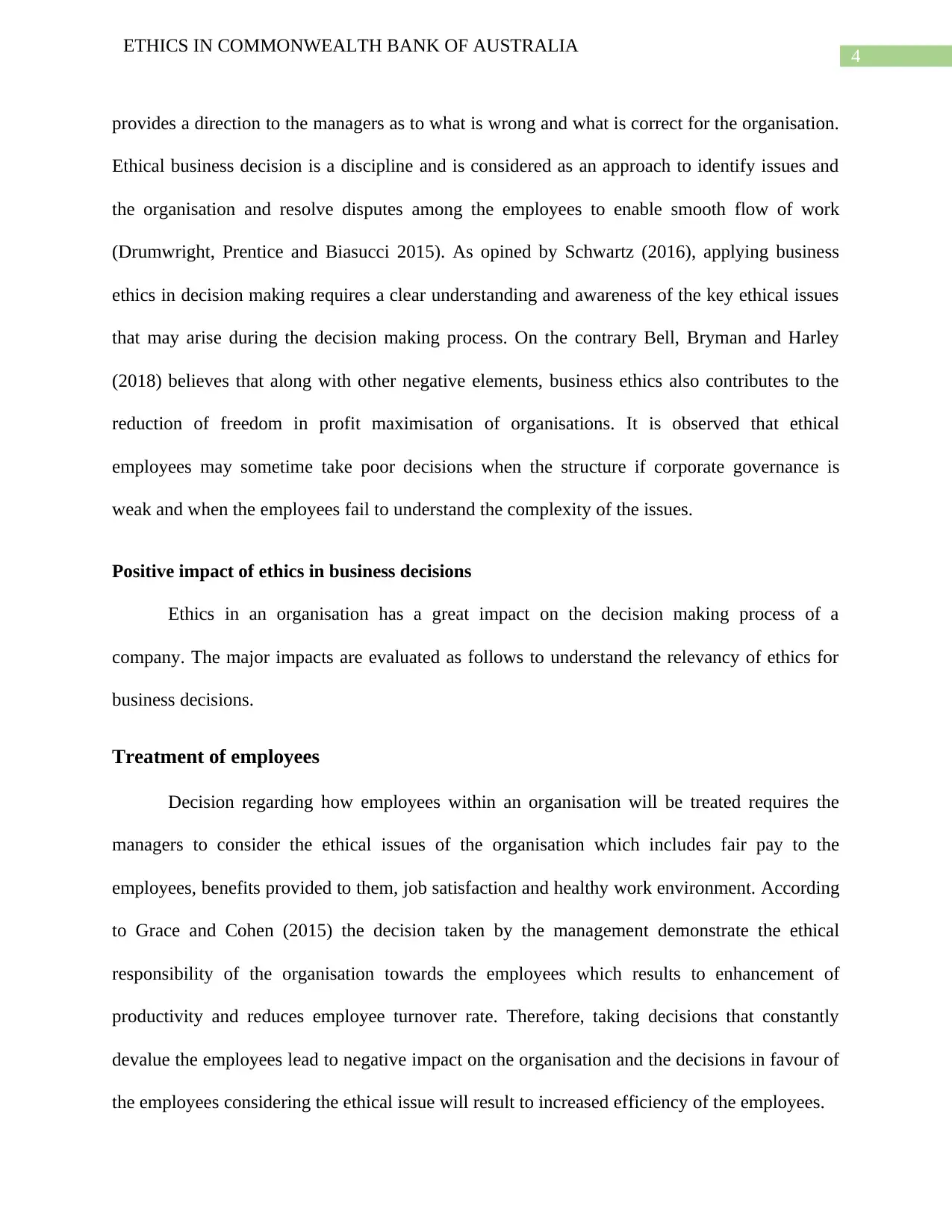
4
ETHICS IN COMMONWEALTH BANK OF AUSTRALIA
provides a direction to the managers as to what is wrong and what is correct for the organisation.
Ethical business decision is a discipline and is considered as an approach to identify issues and
the organisation and resolve disputes among the employees to enable smooth flow of work
(Drumwright, Prentice and Biasucci 2015). As opined by Schwartz (2016), applying business
ethics in decision making requires a clear understanding and awareness of the key ethical issues
that may arise during the decision making process. On the contrary Bell, Bryman and Harley
(2018) believes that along with other negative elements, business ethics also contributes to the
reduction of freedom in profit maximisation of organisations. It is observed that ethical
employees may sometime take poor decisions when the structure if corporate governance is
weak and when the employees fail to understand the complexity of the issues.
Positive impact of ethics in business decisions
Ethics in an organisation has a great impact on the decision making process of a
company. The major impacts are evaluated as follows to understand the relevancy of ethics for
business decisions.
Treatment of employees
Decision regarding how employees within an organisation will be treated requires the
managers to consider the ethical issues of the organisation which includes fair pay to the
employees, benefits provided to them, job satisfaction and healthy work environment. According
to Grace and Cohen (2015) the decision taken by the management demonstrate the ethical
responsibility of the organisation towards the employees which results to enhancement of
productivity and reduces employee turnover rate. Therefore, taking decisions that constantly
devalue the employees lead to negative impact on the organisation and the decisions in favour of
the employees considering the ethical issue will result to increased efficiency of the employees.
ETHICS IN COMMONWEALTH BANK OF AUSTRALIA
provides a direction to the managers as to what is wrong and what is correct for the organisation.
Ethical business decision is a discipline and is considered as an approach to identify issues and
the organisation and resolve disputes among the employees to enable smooth flow of work
(Drumwright, Prentice and Biasucci 2015). As opined by Schwartz (2016), applying business
ethics in decision making requires a clear understanding and awareness of the key ethical issues
that may arise during the decision making process. On the contrary Bell, Bryman and Harley
(2018) believes that along with other negative elements, business ethics also contributes to the
reduction of freedom in profit maximisation of organisations. It is observed that ethical
employees may sometime take poor decisions when the structure if corporate governance is
weak and when the employees fail to understand the complexity of the issues.
Positive impact of ethics in business decisions
Ethics in an organisation has a great impact on the decision making process of a
company. The major impacts are evaluated as follows to understand the relevancy of ethics for
business decisions.
Treatment of employees
Decision regarding how employees within an organisation will be treated requires the
managers to consider the ethical issues of the organisation which includes fair pay to the
employees, benefits provided to them, job satisfaction and healthy work environment. According
to Grace and Cohen (2015) the decision taken by the management demonstrate the ethical
responsibility of the organisation towards the employees which results to enhancement of
productivity and reduces employee turnover rate. Therefore, taking decisions that constantly
devalue the employees lead to negative impact on the organisation and the decisions in favour of
the employees considering the ethical issue will result to increased efficiency of the employees.
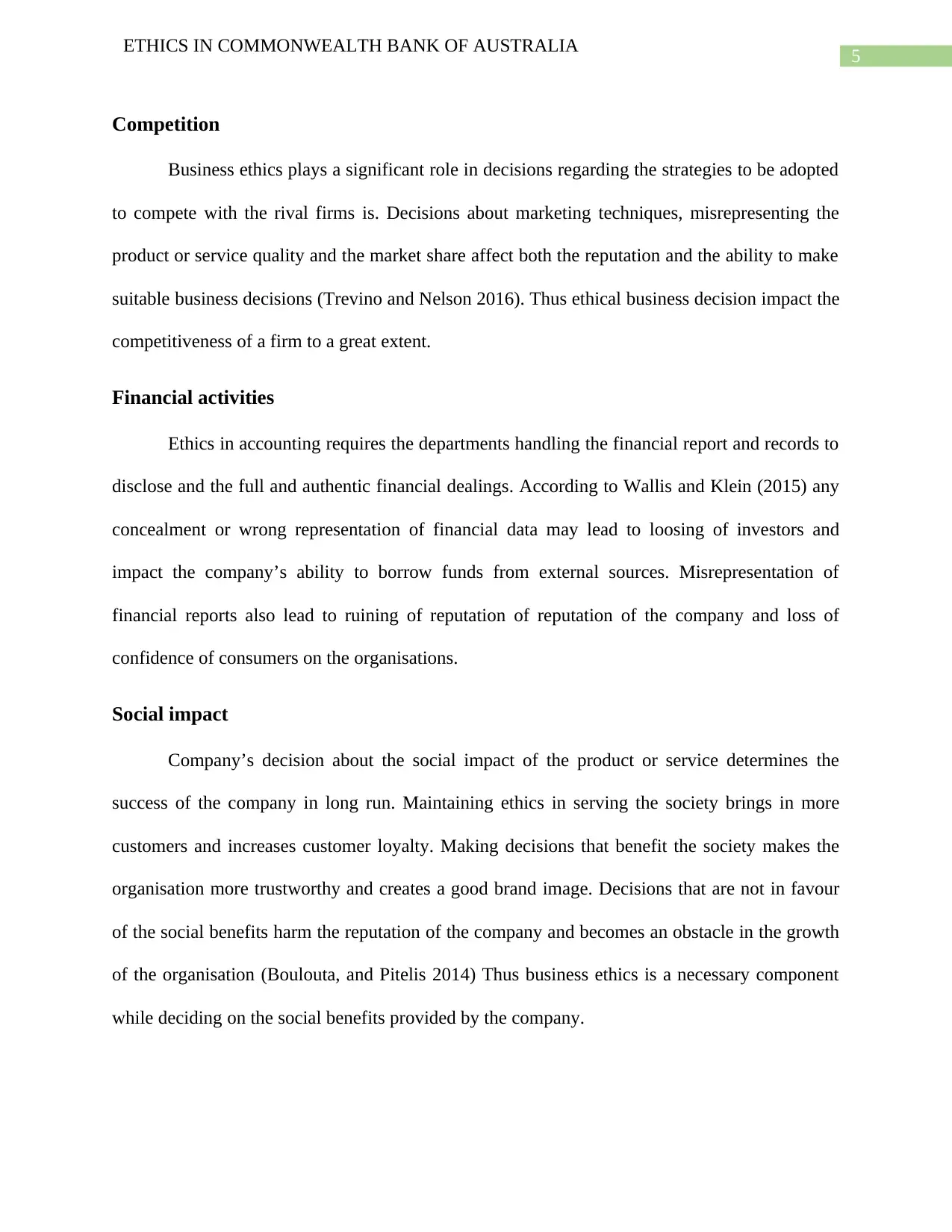
5
ETHICS IN COMMONWEALTH BANK OF AUSTRALIA
Competition
Business ethics plays a significant role in decisions regarding the strategies to be adopted
to compete with the rival firms is. Decisions about marketing techniques, misrepresenting the
product or service quality and the market share affect both the reputation and the ability to make
suitable business decisions (Trevino and Nelson 2016). Thus ethical business decision impact the
competitiveness of a firm to a great extent.
Financial activities
Ethics in accounting requires the departments handling the financial report and records to
disclose and the full and authentic financial dealings. According to Wallis and Klein (2015) any
concealment or wrong representation of financial data may lead to loosing of investors and
impact the company’s ability to borrow funds from external sources. Misrepresentation of
financial reports also lead to ruining of reputation of reputation of the company and loss of
confidence of consumers on the organisations.
Social impact
Company’s decision about the social impact of the product or service determines the
success of the company in long run. Maintaining ethics in serving the society brings in more
customers and increases customer loyalty. Making decisions that benefit the society makes the
organisation more trustworthy and creates a good brand image. Decisions that are not in favour
of the social benefits harm the reputation of the company and becomes an obstacle in the growth
of the organisation (Boulouta, and Pitelis 2014) Thus business ethics is a necessary component
while deciding on the social benefits provided by the company.
ETHICS IN COMMONWEALTH BANK OF AUSTRALIA
Competition
Business ethics plays a significant role in decisions regarding the strategies to be adopted
to compete with the rival firms is. Decisions about marketing techniques, misrepresenting the
product or service quality and the market share affect both the reputation and the ability to make
suitable business decisions (Trevino and Nelson 2016). Thus ethical business decision impact the
competitiveness of a firm to a great extent.
Financial activities
Ethics in accounting requires the departments handling the financial report and records to
disclose and the full and authentic financial dealings. According to Wallis and Klein (2015) any
concealment or wrong representation of financial data may lead to loosing of investors and
impact the company’s ability to borrow funds from external sources. Misrepresentation of
financial reports also lead to ruining of reputation of reputation of the company and loss of
confidence of consumers on the organisations.
Social impact
Company’s decision about the social impact of the product or service determines the
success of the company in long run. Maintaining ethics in serving the society brings in more
customers and increases customer loyalty. Making decisions that benefit the society makes the
organisation more trustworthy and creates a good brand image. Decisions that are not in favour
of the social benefits harm the reputation of the company and becomes an obstacle in the growth
of the organisation (Boulouta, and Pitelis 2014) Thus business ethics is a necessary component
while deciding on the social benefits provided by the company.
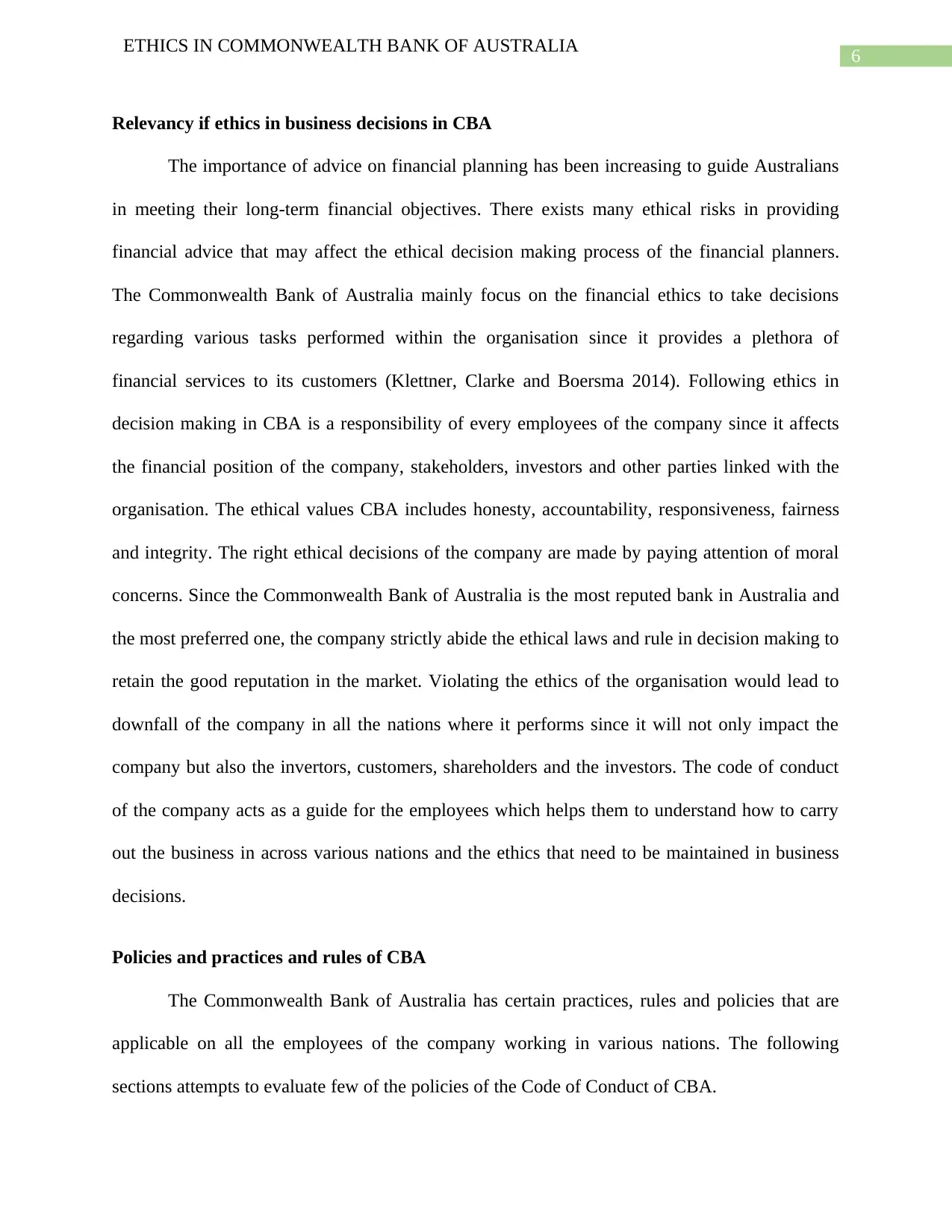
6
ETHICS IN COMMONWEALTH BANK OF AUSTRALIA
Relevancy if ethics in business decisions in CBA
The importance of advice on financial planning has been increasing to guide Australians
in meeting their long-term financial objectives. There exists many ethical risks in providing
financial advice that may affect the ethical decision making process of the financial planners.
The Commonwealth Bank of Australia mainly focus on the financial ethics to take decisions
regarding various tasks performed within the organisation since it provides a plethora of
financial services to its customers (Klettner, Clarke and Boersma 2014). Following ethics in
decision making in CBA is a responsibility of every employees of the company since it affects
the financial position of the company, stakeholders, investors and other parties linked with the
organisation. The ethical values CBA includes honesty, accountability, responsiveness, fairness
and integrity. The right ethical decisions of the company are made by paying attention of moral
concerns. Since the Commonwealth Bank of Australia is the most reputed bank in Australia and
the most preferred one, the company strictly abide the ethical laws and rule in decision making to
retain the good reputation in the market. Violating the ethics of the organisation would lead to
downfall of the company in all the nations where it performs since it will not only impact the
company but also the invertors, customers, shareholders and the investors. The code of conduct
of the company acts as a guide for the employees which helps them to understand how to carry
out the business in across various nations and the ethics that need to be maintained in business
decisions.
Policies and practices and rules of CBA
The Commonwealth Bank of Australia has certain practices, rules and policies that are
applicable on all the employees of the company working in various nations. The following
sections attempts to evaluate few of the policies of the Code of Conduct of CBA.
ETHICS IN COMMONWEALTH BANK OF AUSTRALIA
Relevancy if ethics in business decisions in CBA
The importance of advice on financial planning has been increasing to guide Australians
in meeting their long-term financial objectives. There exists many ethical risks in providing
financial advice that may affect the ethical decision making process of the financial planners.
The Commonwealth Bank of Australia mainly focus on the financial ethics to take decisions
regarding various tasks performed within the organisation since it provides a plethora of
financial services to its customers (Klettner, Clarke and Boersma 2014). Following ethics in
decision making in CBA is a responsibility of every employees of the company since it affects
the financial position of the company, stakeholders, investors and other parties linked with the
organisation. The ethical values CBA includes honesty, accountability, responsiveness, fairness
and integrity. The right ethical decisions of the company are made by paying attention of moral
concerns. Since the Commonwealth Bank of Australia is the most reputed bank in Australia and
the most preferred one, the company strictly abide the ethical laws and rule in decision making to
retain the good reputation in the market. Violating the ethics of the organisation would lead to
downfall of the company in all the nations where it performs since it will not only impact the
company but also the invertors, customers, shareholders and the investors. The code of conduct
of the company acts as a guide for the employees which helps them to understand how to carry
out the business in across various nations and the ethics that need to be maintained in business
decisions.
Policies and practices and rules of CBA
The Commonwealth Bank of Australia has certain practices, rules and policies that are
applicable on all the employees of the company working in various nations. The following
sections attempts to evaluate few of the policies of the Code of Conduct of CBA.
Paraphrase This Document
Need a fresh take? Get an instant paraphrase of this document with our AI Paraphraser
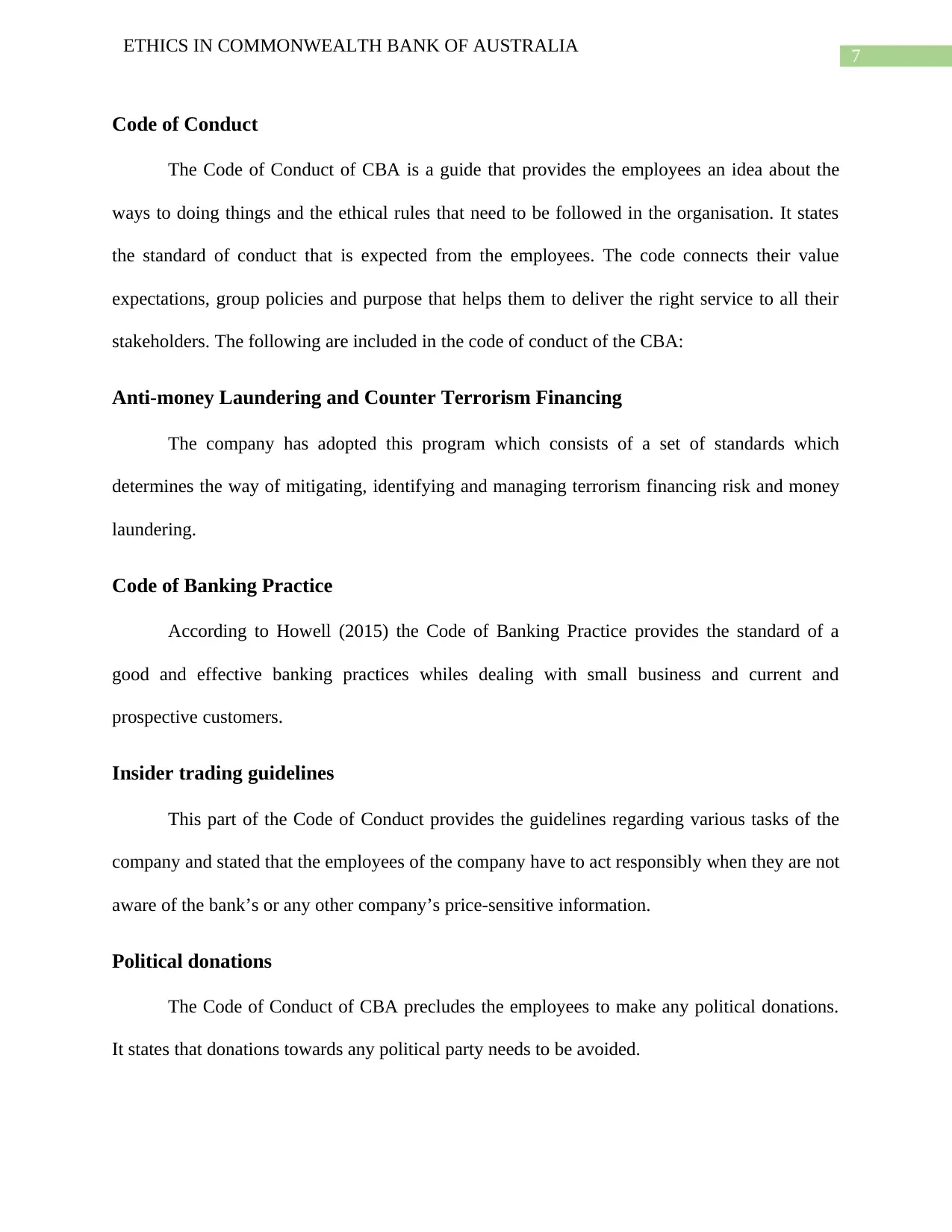
7
ETHICS IN COMMONWEALTH BANK OF AUSTRALIA
Code of Conduct
The Code of Conduct of CBA is a guide that provides the employees an idea about the
ways to doing things and the ethical rules that need to be followed in the organisation. It states
the standard of conduct that is expected from the employees. The code connects their value
expectations, group policies and purpose that helps them to deliver the right service to all their
stakeholders. The following are included in the code of conduct of the CBA:
Anti-money Laundering and Counter Terrorism Financing
The company has adopted this program which consists of a set of standards which
determines the way of mitigating, identifying and managing terrorism financing risk and money
laundering.
Code of Banking Practice
According to Howell (2015) the Code of Banking Practice provides the standard of a
good and effective banking practices whiles dealing with small business and current and
prospective customers.
Insider trading guidelines
This part of the Code of Conduct provides the guidelines regarding various tasks of the
company and stated that the employees of the company have to act responsibly when they are not
aware of the bank’s or any other company’s price-sensitive information.
Political donations
The Code of Conduct of CBA precludes the employees to make any political donations.
It states that donations towards any political party needs to be avoided.
ETHICS IN COMMONWEALTH BANK OF AUSTRALIA
Code of Conduct
The Code of Conduct of CBA is a guide that provides the employees an idea about the
ways to doing things and the ethical rules that need to be followed in the organisation. It states
the standard of conduct that is expected from the employees. The code connects their value
expectations, group policies and purpose that helps them to deliver the right service to all their
stakeholders. The following are included in the code of conduct of the CBA:
Anti-money Laundering and Counter Terrorism Financing
The company has adopted this program which consists of a set of standards which
determines the way of mitigating, identifying and managing terrorism financing risk and money
laundering.
Code of Banking Practice
According to Howell (2015) the Code of Banking Practice provides the standard of a
good and effective banking practices whiles dealing with small business and current and
prospective customers.
Insider trading guidelines
This part of the Code of Conduct provides the guidelines regarding various tasks of the
company and stated that the employees of the company have to act responsibly when they are not
aware of the bank’s or any other company’s price-sensitive information.
Political donations
The Code of Conduct of CBA precludes the employees to make any political donations.
It states that donations towards any political party needs to be avoided.
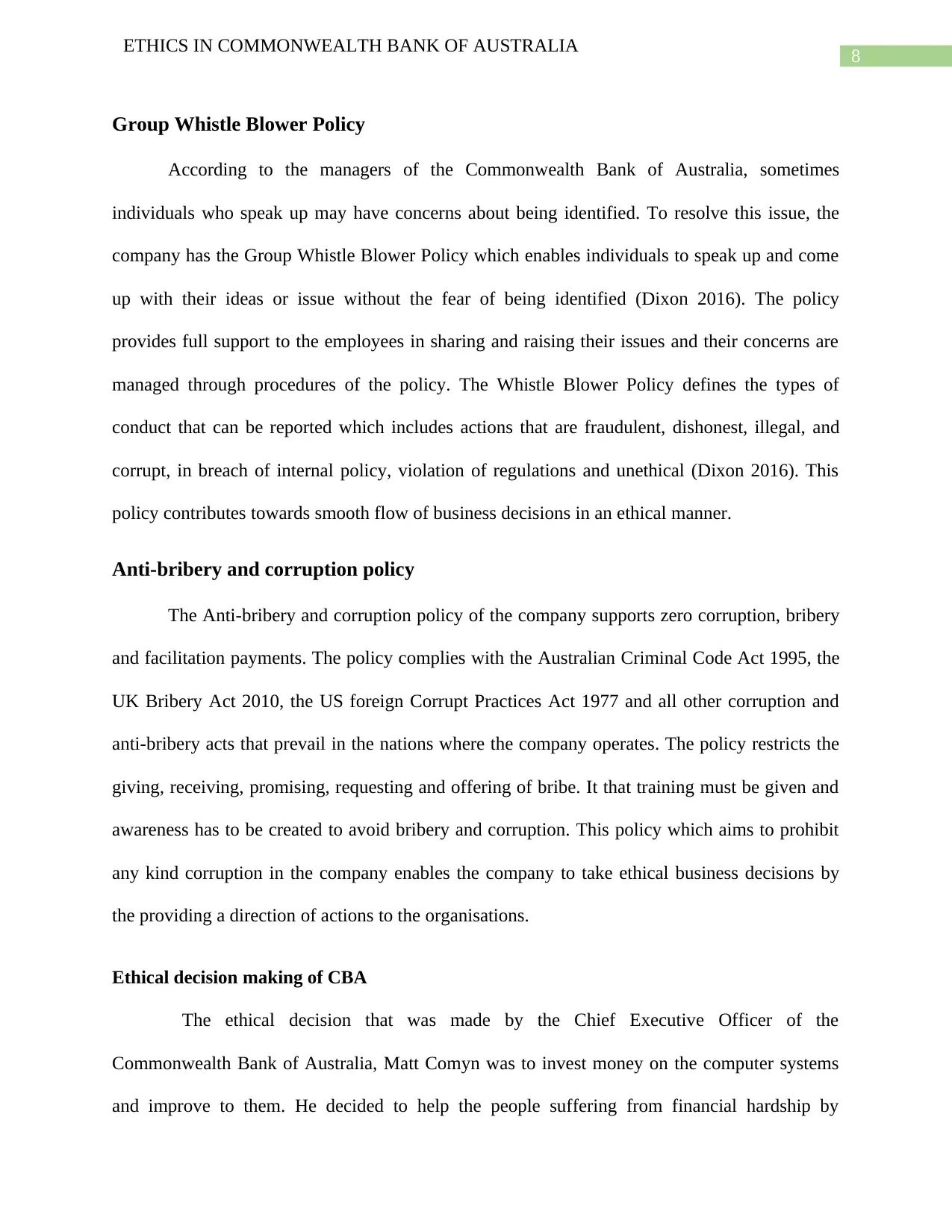
8
ETHICS IN COMMONWEALTH BANK OF AUSTRALIA
Group Whistle Blower Policy
According to the managers of the Commonwealth Bank of Australia, sometimes
individuals who speak up may have concerns about being identified. To resolve this issue, the
company has the Group Whistle Blower Policy which enables individuals to speak up and come
up with their ideas or issue without the fear of being identified (Dixon 2016). The policy
provides full support to the employees in sharing and raising their issues and their concerns are
managed through procedures of the policy. The Whistle Blower Policy defines the types of
conduct that can be reported which includes actions that are fraudulent, dishonest, illegal, and
corrupt, in breach of internal policy, violation of regulations and unethical (Dixon 2016). This
policy contributes towards smooth flow of business decisions in an ethical manner.
Anti-bribery and corruption policy
The Anti-bribery and corruption policy of the company supports zero corruption, bribery
and facilitation payments. The policy complies with the Australian Criminal Code Act 1995, the
UK Bribery Act 2010, the US foreign Corrupt Practices Act 1977 and all other corruption and
anti-bribery acts that prevail in the nations where the company operates. The policy restricts the
giving, receiving, promising, requesting and offering of bribe. It that training must be given and
awareness has to be created to avoid bribery and corruption. This policy which aims to prohibit
any kind corruption in the company enables the company to take ethical business decisions by
the providing a direction of actions to the organisations.
Ethical decision making of CBA
The ethical decision that was made by the Chief Executive Officer of the
Commonwealth Bank of Australia, Matt Comyn was to invest money on the computer systems
and improve to them. He decided to help the people suffering from financial hardship by
ETHICS IN COMMONWEALTH BANK OF AUSTRALIA
Group Whistle Blower Policy
According to the managers of the Commonwealth Bank of Australia, sometimes
individuals who speak up may have concerns about being identified. To resolve this issue, the
company has the Group Whistle Blower Policy which enables individuals to speak up and come
up with their ideas or issue without the fear of being identified (Dixon 2016). The policy
provides full support to the employees in sharing and raising their issues and their concerns are
managed through procedures of the policy. The Whistle Blower Policy defines the types of
conduct that can be reported which includes actions that are fraudulent, dishonest, illegal, and
corrupt, in breach of internal policy, violation of regulations and unethical (Dixon 2016). This
policy contributes towards smooth flow of business decisions in an ethical manner.
Anti-bribery and corruption policy
The Anti-bribery and corruption policy of the company supports zero corruption, bribery
and facilitation payments. The policy complies with the Australian Criminal Code Act 1995, the
UK Bribery Act 2010, the US foreign Corrupt Practices Act 1977 and all other corruption and
anti-bribery acts that prevail in the nations where the company operates. The policy restricts the
giving, receiving, promising, requesting and offering of bribe. It that training must be given and
awareness has to be created to avoid bribery and corruption. This policy which aims to prohibit
any kind corruption in the company enables the company to take ethical business decisions by
the providing a direction of actions to the organisations.
Ethical decision making of CBA
The ethical decision that was made by the Chief Executive Officer of the
Commonwealth Bank of Australia, Matt Comyn was to invest money on the computer systems
and improve to them. He decided to help the people suffering from financial hardship by
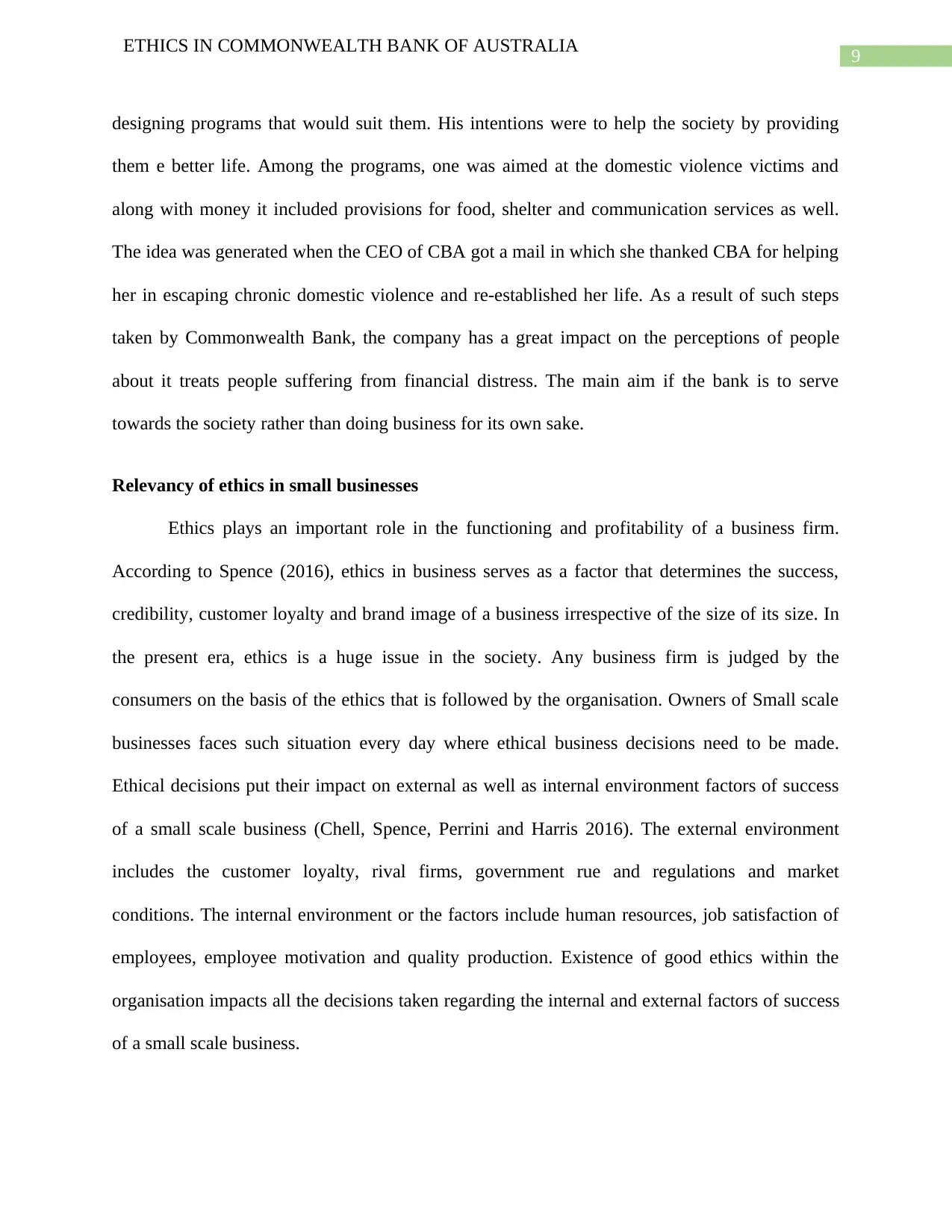
9
ETHICS IN COMMONWEALTH BANK OF AUSTRALIA
designing programs that would suit them. His intentions were to help the society by providing
them e better life. Among the programs, one was aimed at the domestic violence victims and
along with money it included provisions for food, shelter and communication services as well.
The idea was generated when the CEO of CBA got a mail in which she thanked CBA for helping
her in escaping chronic domestic violence and re-established her life. As a result of such steps
taken by Commonwealth Bank, the company has a great impact on the perceptions of people
about it treats people suffering from financial distress. The main aim if the bank is to serve
towards the society rather than doing business for its own sake.
Relevancy of ethics in small businesses
Ethics plays an important role in the functioning and profitability of a business firm.
According to Spence (2016), ethics in business serves as a factor that determines the success,
credibility, customer loyalty and brand image of a business irrespective of the size of its size. In
the present era, ethics is a huge issue in the society. Any business firm is judged by the
consumers on the basis of the ethics that is followed by the organisation. Owners of Small scale
businesses faces such situation every day where ethical business decisions need to be made.
Ethical decisions put their impact on external as well as internal environment factors of success
of a small scale business (Chell, Spence, Perrini and Harris 2016). The external environment
includes the customer loyalty, rival firms, government rue and regulations and market
conditions. The internal environment or the factors include human resources, job satisfaction of
employees, employee motivation and quality production. Existence of good ethics within the
organisation impacts all the decisions taken regarding the internal and external factors of success
of a small scale business.
ETHICS IN COMMONWEALTH BANK OF AUSTRALIA
designing programs that would suit them. His intentions were to help the society by providing
them e better life. Among the programs, one was aimed at the domestic violence victims and
along with money it included provisions for food, shelter and communication services as well.
The idea was generated when the CEO of CBA got a mail in which she thanked CBA for helping
her in escaping chronic domestic violence and re-established her life. As a result of such steps
taken by Commonwealth Bank, the company has a great impact on the perceptions of people
about it treats people suffering from financial distress. The main aim if the bank is to serve
towards the society rather than doing business for its own sake.
Relevancy of ethics in small businesses
Ethics plays an important role in the functioning and profitability of a business firm.
According to Spence (2016), ethics in business serves as a factor that determines the success,
credibility, customer loyalty and brand image of a business irrespective of the size of its size. In
the present era, ethics is a huge issue in the society. Any business firm is judged by the
consumers on the basis of the ethics that is followed by the organisation. Owners of Small scale
businesses faces such situation every day where ethical business decisions need to be made.
Ethical decisions put their impact on external as well as internal environment factors of success
of a small scale business (Chell, Spence, Perrini and Harris 2016). The external environment
includes the customer loyalty, rival firms, government rue and regulations and market
conditions. The internal environment or the factors include human resources, job satisfaction of
employees, employee motivation and quality production. Existence of good ethics within the
organisation impacts all the decisions taken regarding the internal and external factors of success
of a small scale business.
Secure Best Marks with AI Grader
Need help grading? Try our AI Grader for instant feedback on your assignments.
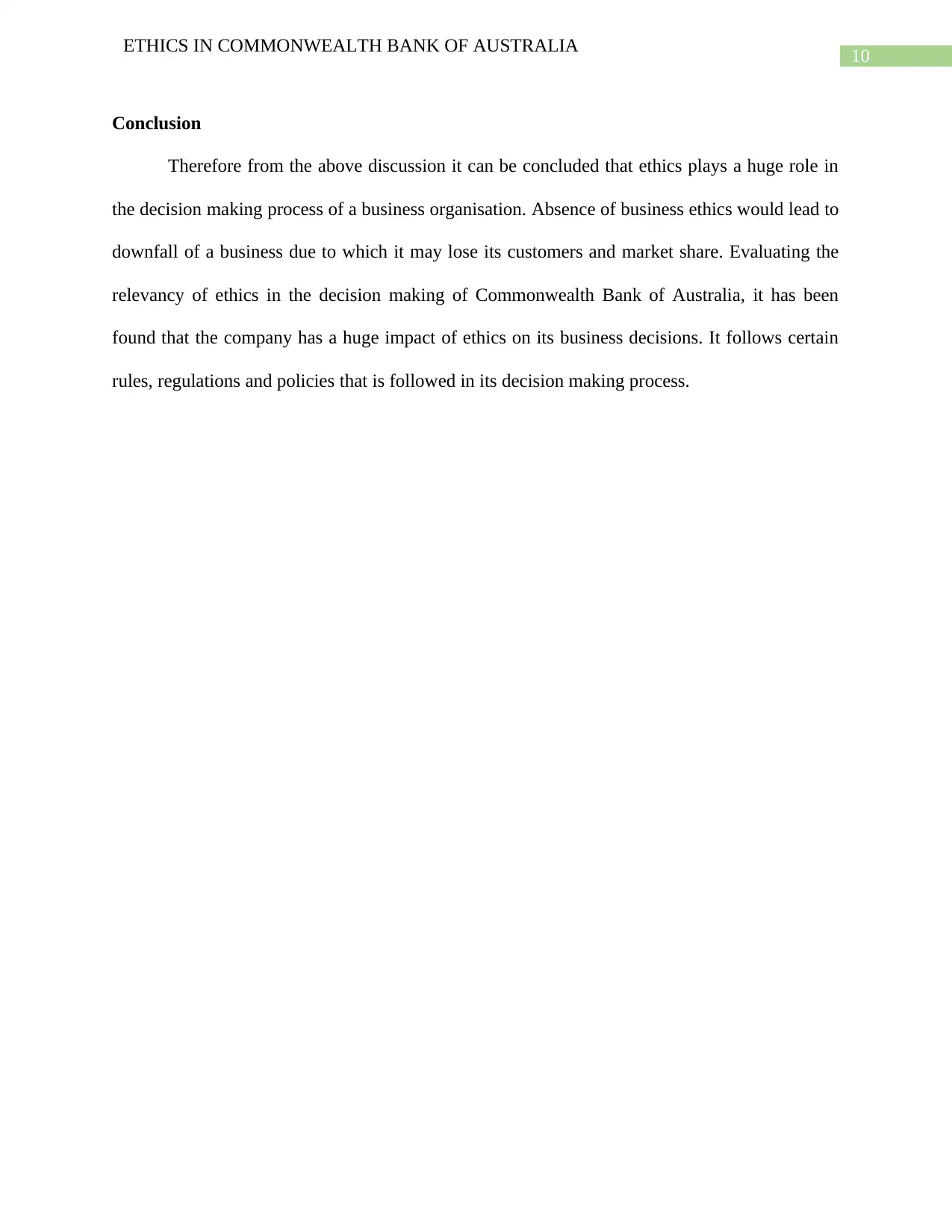
10
ETHICS IN COMMONWEALTH BANK OF AUSTRALIA
Conclusion
Therefore from the above discussion it can be concluded that ethics plays a huge role in
the decision making process of a business organisation. Absence of business ethics would lead to
downfall of a business due to which it may lose its customers and market share. Evaluating the
relevancy of ethics in the decision making of Commonwealth Bank of Australia, it has been
found that the company has a huge impact of ethics on its business decisions. It follows certain
rules, regulations and policies that is followed in its decision making process.
ETHICS IN COMMONWEALTH BANK OF AUSTRALIA
Conclusion
Therefore from the above discussion it can be concluded that ethics plays a huge role in
the decision making process of a business organisation. Absence of business ethics would lead to
downfall of a business due to which it may lose its customers and market share. Evaluating the
relevancy of ethics in the decision making of Commonwealth Bank of Australia, it has been
found that the company has a huge impact of ethics on its business decisions. It follows certain
rules, regulations and policies that is followed in its decision making process.
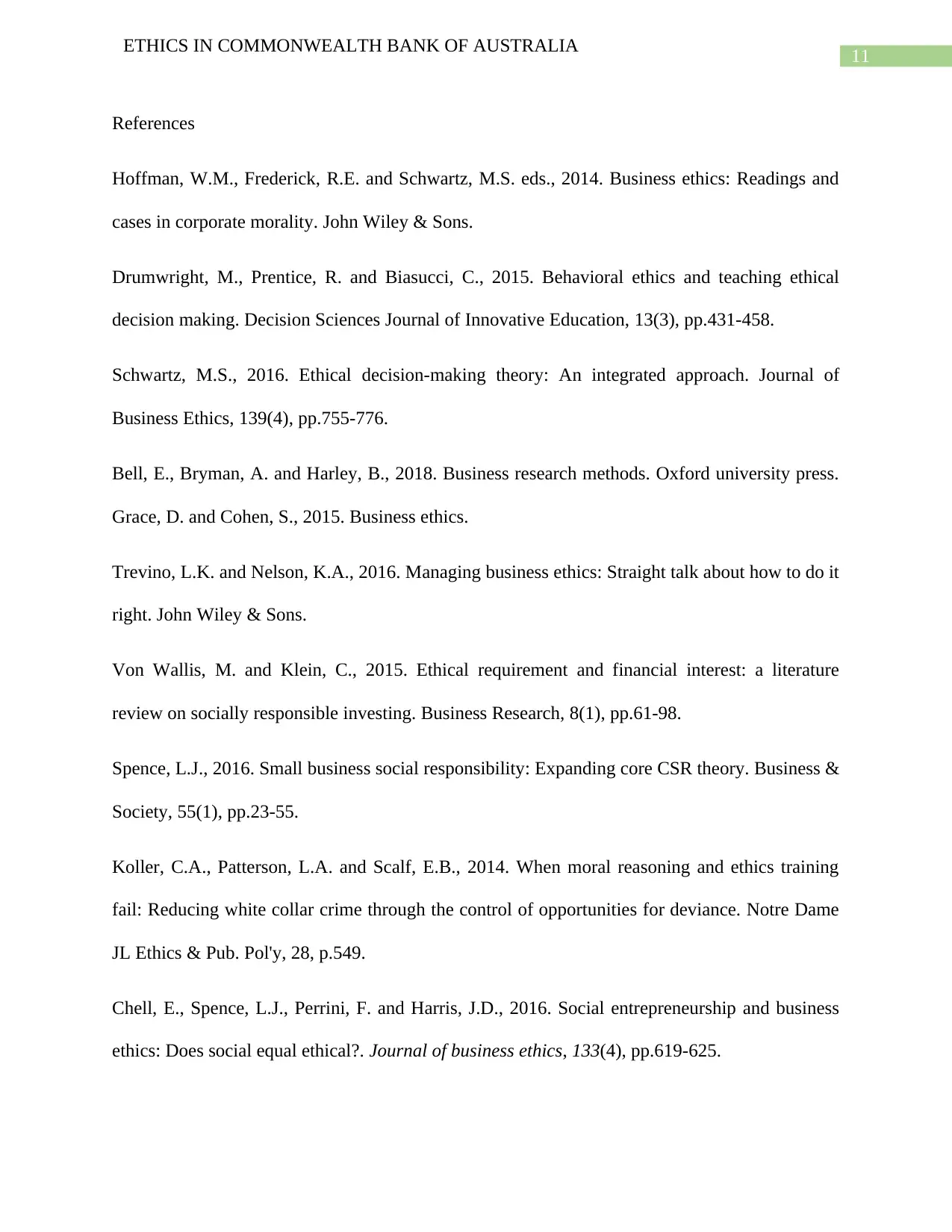
11
ETHICS IN COMMONWEALTH BANK OF AUSTRALIA
References
Hoffman, W.M., Frederick, R.E. and Schwartz, M.S. eds., 2014. Business ethics: Readings and
cases in corporate morality. John Wiley & Sons.
Drumwright, M., Prentice, R. and Biasucci, C., 2015. Behavioral ethics and teaching ethical
decision making. Decision Sciences Journal of Innovative Education, 13(3), pp.431-458.
Schwartz, M.S., 2016. Ethical decision-making theory: An integrated approach. Journal of
Business Ethics, 139(4), pp.755-776.
Bell, E., Bryman, A. and Harley, B., 2018. Business research methods. Oxford university press.
Grace, D. and Cohen, S., 2015. Business ethics.
Trevino, L.K. and Nelson, K.A., 2016. Managing business ethics: Straight talk about how to do it
right. John Wiley & Sons.
Von Wallis, M. and Klein, C., 2015. Ethical requirement and financial interest: a literature
review on socially responsible investing. Business Research, 8(1), pp.61-98.
Spence, L.J., 2016. Small business social responsibility: Expanding core CSR theory. Business &
Society, 55(1), pp.23-55.
Koller, C.A., Patterson, L.A. and Scalf, E.B., 2014. When moral reasoning and ethics training
fail: Reducing white collar crime through the control of opportunities for deviance. Notre Dame
JL Ethics & Pub. Pol'y, 28, p.549.
Chell, E., Spence, L.J., Perrini, F. and Harris, J.D., 2016. Social entrepreneurship and business
ethics: Does social equal ethical?. Journal of business ethics, 133(4), pp.619-625.
ETHICS IN COMMONWEALTH BANK OF AUSTRALIA
References
Hoffman, W.M., Frederick, R.E. and Schwartz, M.S. eds., 2014. Business ethics: Readings and
cases in corporate morality. John Wiley & Sons.
Drumwright, M., Prentice, R. and Biasucci, C., 2015. Behavioral ethics and teaching ethical
decision making. Decision Sciences Journal of Innovative Education, 13(3), pp.431-458.
Schwartz, M.S., 2016. Ethical decision-making theory: An integrated approach. Journal of
Business Ethics, 139(4), pp.755-776.
Bell, E., Bryman, A. and Harley, B., 2018. Business research methods. Oxford university press.
Grace, D. and Cohen, S., 2015. Business ethics.
Trevino, L.K. and Nelson, K.A., 2016. Managing business ethics: Straight talk about how to do it
right. John Wiley & Sons.
Von Wallis, M. and Klein, C., 2015. Ethical requirement and financial interest: a literature
review on socially responsible investing. Business Research, 8(1), pp.61-98.
Spence, L.J., 2016. Small business social responsibility: Expanding core CSR theory. Business &
Society, 55(1), pp.23-55.
Koller, C.A., Patterson, L.A. and Scalf, E.B., 2014. When moral reasoning and ethics training
fail: Reducing white collar crime through the control of opportunities for deviance. Notre Dame
JL Ethics & Pub. Pol'y, 28, p.549.
Chell, E., Spence, L.J., Perrini, F. and Harris, J.D., 2016. Social entrepreneurship and business
ethics: Does social equal ethical?. Journal of business ethics, 133(4), pp.619-625.
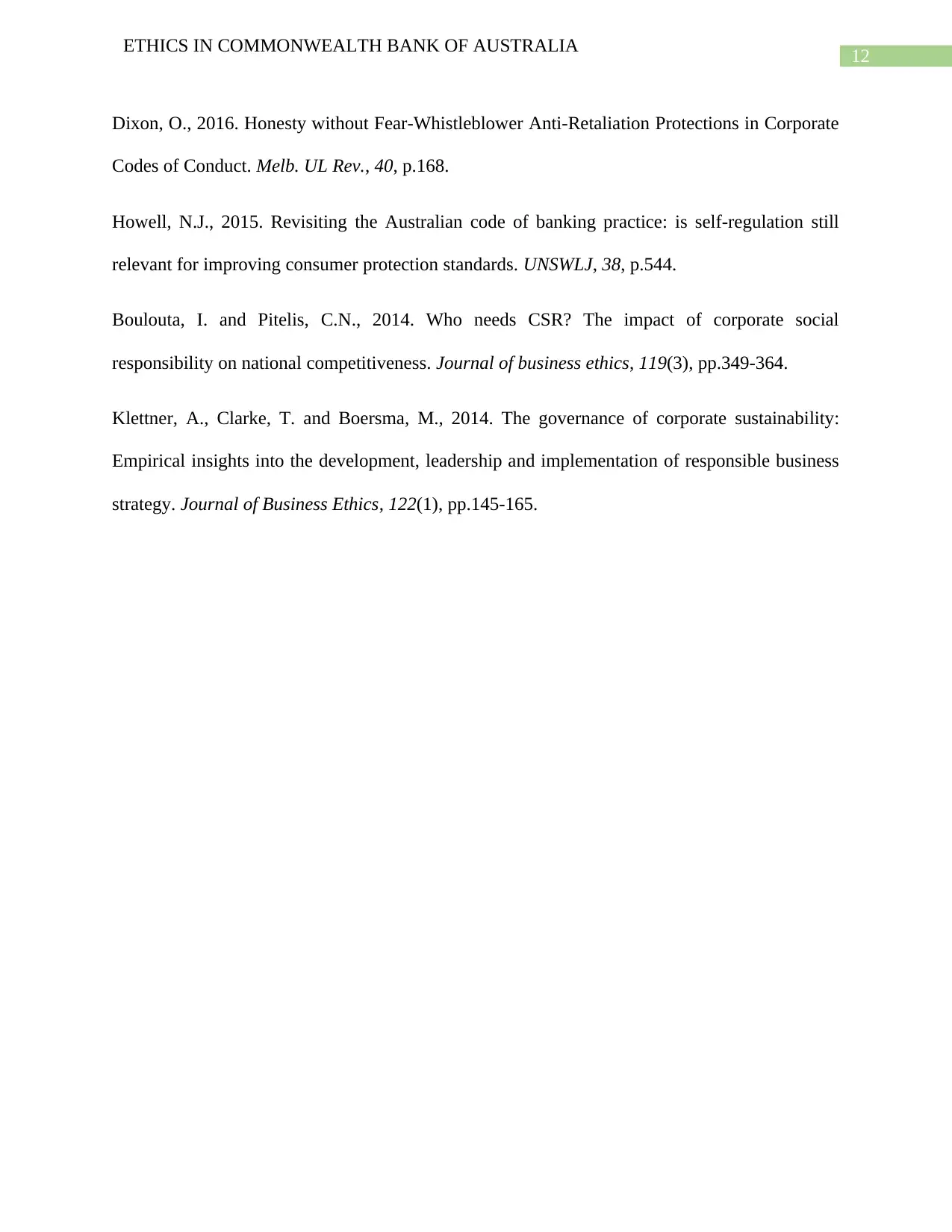
12
ETHICS IN COMMONWEALTH BANK OF AUSTRALIA
Dixon, O., 2016. Honesty without Fear-Whistleblower Anti-Retaliation Protections in Corporate
Codes of Conduct. Melb. UL Rev., 40, p.168.
Howell, N.J., 2015. Revisiting the Australian code of banking practice: is self-regulation still
relevant for improving consumer protection standards. UNSWLJ, 38, p.544.
Boulouta, I. and Pitelis, C.N., 2014. Who needs CSR? The impact of corporate social
responsibility on national competitiveness. Journal of business ethics, 119(3), pp.349-364.
Klettner, A., Clarke, T. and Boersma, M., 2014. The governance of corporate sustainability:
Empirical insights into the development, leadership and implementation of responsible business
strategy. Journal of Business Ethics, 122(1), pp.145-165.
ETHICS IN COMMONWEALTH BANK OF AUSTRALIA
Dixon, O., 2016. Honesty without Fear-Whistleblower Anti-Retaliation Protections in Corporate
Codes of Conduct. Melb. UL Rev., 40, p.168.
Howell, N.J., 2015. Revisiting the Australian code of banking practice: is self-regulation still
relevant for improving consumer protection standards. UNSWLJ, 38, p.544.
Boulouta, I. and Pitelis, C.N., 2014. Who needs CSR? The impact of corporate social
responsibility on national competitiveness. Journal of business ethics, 119(3), pp.349-364.
Klettner, A., Clarke, T. and Boersma, M., 2014. The governance of corporate sustainability:
Empirical insights into the development, leadership and implementation of responsible business
strategy. Journal of Business Ethics, 122(1), pp.145-165.
1 out of 13
Related Documents
Your All-in-One AI-Powered Toolkit for Academic Success.
+13062052269
info@desklib.com
Available 24*7 on WhatsApp / Email
![[object Object]](/_next/static/media/star-bottom.7253800d.svg)
Unlock your academic potential
© 2024 | Zucol Services PVT LTD | All rights reserved.





